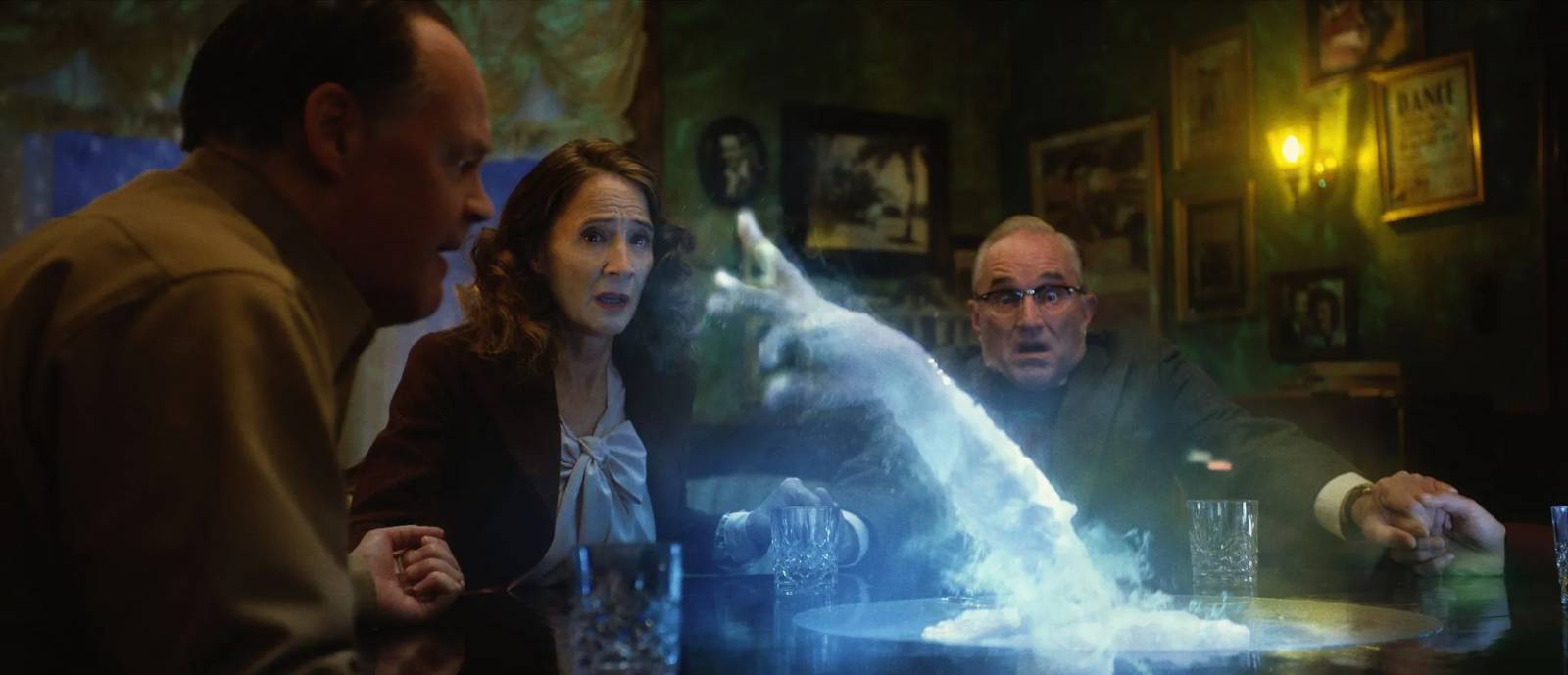It’s supposed to be a nostalgic, supportive night. On December 27, 1945, five military veterans and friends from childhood gather inside a Brooklyn brownstone to reminisce about old times, celebrate the end of World War II, and comfort a grieving host whose wife has recently passed. But what starts with sentimental banter and a strong whiskey buzz quickly spirals into an unexpected séance that conjures the paranormal, sparks some paranoia, and builds to a possession that seems hell-bent on staining the wood-paneled parlor with as much blood as possible.
That’s the fun, gory, alarming premise behind Brooklyn 45, Ted Geoghegan’s third feature film that asks a lot of heavy questions in-between its abrupt moments of splatter. When does the war really end? Who decides when it’s over? How do you determine ethics in the midst of battle? Within the useful limitations of a one-night, one-location get-together, Geoghegan mostly makes good on his script, which feels as if adapted from a stage play and provides enough cinematic flourishes to warrant a 90-minute conspiratorial conversation.
Lieutenant Colonel Clive “Hock” Hockstatter (Larry Fessenden) is responsible for this gathering––he’s invited army interrogator Marla (Anne Ramsay) and her husband Bob (Rob E. Rains), along with Major Archie Stanton (Jeremy Holm), a closeted gay man accused of committing war crimes in Berlin, and Major Paul DiFranco (Ezra Buzzington), a severely patriotic officer. For a while the drinks flow, memories are shared, the radio enlivens the parlor. A new year with a healthier future awaits. Until Clive turns down the mood with a personal request: he wants everyone to hold hands and conjure the spectral presence of his wife, Susan, who committed suicide after being driven mad by radio propaganda and the belief that their German neighbor was a Nazi.
Though his friends oblige without much belief in Hock’s conviction, they’re soon disproved when something bangs from inside a closet door, candles alight, and a breeze filters through the room. Susan’s haunting voice then cuts through the panic, forcing Hock to vomit up a white ectoplasm onto the table, where his wife’s ghostly arm emerges. When he attempts to reach out to her, breaking the hand-holding circle, her presence vanishes, leaving the entire group mortified by what they’ve witnessed. A terrifying night has only just begun.
It’s best not to spoil much more, except to say a gun makes an appearance and eventually that German neighbor (Kristina Klebe), a mother and grocer, enters the picture, turning the movie into an existential and accusatory affair. Geoghegan keeps tension brewing, allowing each guest to have their monologuing moment while breaking up sometimes-repetitive dialogue with the genre’s punctuations––a whirring radio, errant clangs, whispered screams––without the structural seams showing too much.
The risk for these kinds of stories––the best ranging from 12 Angry Men to One Night in Miami––is that they lose momentum after the initial setup. You need strong, convincing characters to make persuasive arguments and unearth deep-seated secrets. Brooklyn 45 supplies such––particularly with Buzzington, whose depiction of a hard-lined Major never wavers into caricature. As a primary antagonist, he keeps a vicious edge and represents the population of Americans wary that Nazi spies still lurk all around, providing narrative thrust as the group attempts to close the window into the other side.
If the ending feels too abrupt or unsettled, it’s only because there’s no other way to repair the damage that’s been brewing under the surface. “Good men can change. They can be blinded by hate,” someone observes, and much of Brooklyn 45 wrestles with ways to understand heroism and honor when it means committing atrocities to achieve them. Without time and incentive for clear thought and understanding, and when trapped inside someone’s home with no means of escape, it’s easy to create an enemy.
Brooklyn 45 premiered at SXSW 2023 and will arrive on Shudder.

